The 2019 Global Kidney Health Atlas highlights the burden of kidney disease and inequity in access to kidney care across the world. The Atlas recommends urgent steps to tackle this global problem.
- The 2019 Global Kidney Health Atlas is now available from the International Society of Nephrology
- The Atlas highlights the rising global burden of kidney diseases and inequity in access to kidney care
- It recommends several strategies that can be adopted to tackle this global problem
Read More..
Origin of the Global Kidney Health Atlas
The Global Kidney Health Atlas originated in 2017, when the first Atlas was presented at the World Congress of Nephrology, held in Mexico. At that time, there was great variability in access to kidney care across all the World Health Organization regions, especially the low and lower-middle income countries.It was the first systematic endeavor to collect data on access to health information, medications, financial, and human resources, as well as models for service delivery and R&D in the area of chronic kidney disease (CKD), which affects 10 percent of the global population. The current 2019 Atlas is the second installment after the 2017 Atlas.
Kidney Health: Facts & Figures
- 0.1 percent of the world’s population has end-stage kidney disease (ESKD)
- 14.5 million people will have ESKD by 2030, but only 5.4 million with receive treatment
- Prevalence of ESKD is higher in upper-middle (0.1%) and high (0.2%) income countries
- Prevalence of ESKD is lower in low (0.05%) and lower-middle (0.07%) income countries
- 4 percent of people in low income and 10 percent in lower-middle income countries have access to dialysis or kidney transplantation
- 30 percent of people in upper-middle and 60 percent in high-income countries have access to dialysis or kidney transplantation
- Diabetes-related ESKD incidence is higher than overall ESKD incidence
- Kidney diseases are associated with a higher risk of heart attacks, strokes, and amputations
- 2 million people die annually worldwide due to lack of access to dialysis or kidney transplantation
Barriers Preventing Access to Optimal Kidney Care
The major barriers that prevent access to optimal kidney care, as reported by various countries across the globe, are briefly highlighted below:- Financial barriers: 64 percent of countries
- Patient knowledge/attitudes: 63 percent of countries
- Lack of nephrologists: 60 percent of countries
- Lack of general physicians: 58 percent of countries
- Distance from healthcare facilities: 55 percent of countries
- Availability/access/capacity of healthcare system: 55 percent of countries
- Lack of political priority: 45 percent of countries
- Miscellaneous barriers: 10 percent of countries
- No barriers: 8 percent of countries
Key Recommendations of the Global Kidney Health Atlas
- Increase healthcare financing for kidney diseases
- Introduce multidisciplinary teams, task shifting, and telemedicine to tackle health personnel shortages
- Introduce surveillance systems to assess the burden of kidney diseases
- Promote kidney disease care through advocacy and actionable policies
- Promote peritoneal dialysis for initial treatment, which involves low-end technology and is cost-effective
- Develop innovative and affordable dialysis techniques through scientific research
- Promote kidney transplantation through legislation and health policies
Conclusion
The 2019 Global Kidney Health Atlas is in favor of promoting public-funded non-dialysis treatments for delaying progression of kidney diseases as a worldwide goal. This is aimed at addressing the urgent issues of rising disease burden and increasing kidney care expenses, especially for high-end interventions such as hemodialysis and kidney transplantation.Reference:
- Global Kidney Health Atlas - (https://www.theisn.org/all-articles/665-global-kidney-health-atlas)
Source-Medindia
















